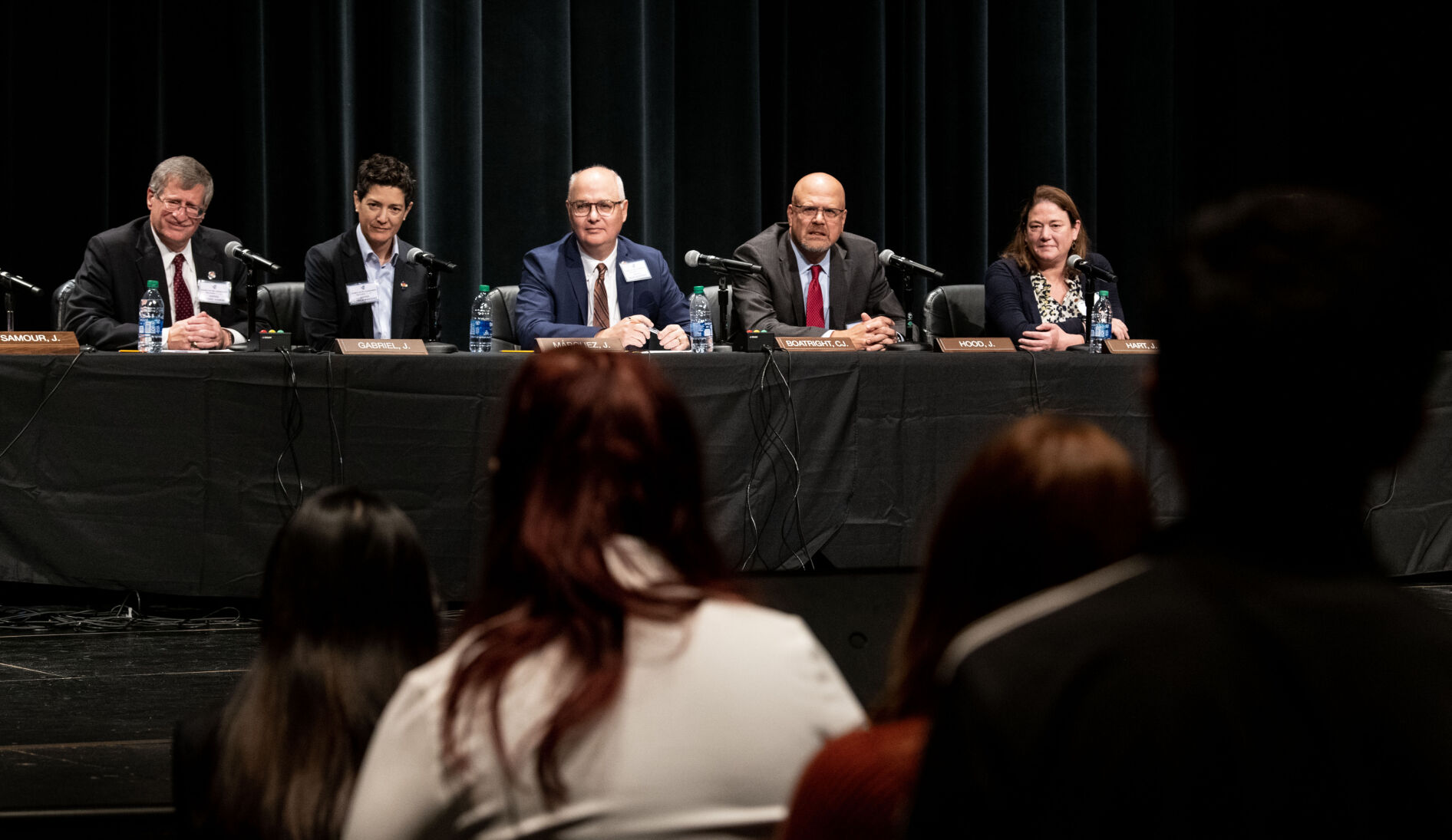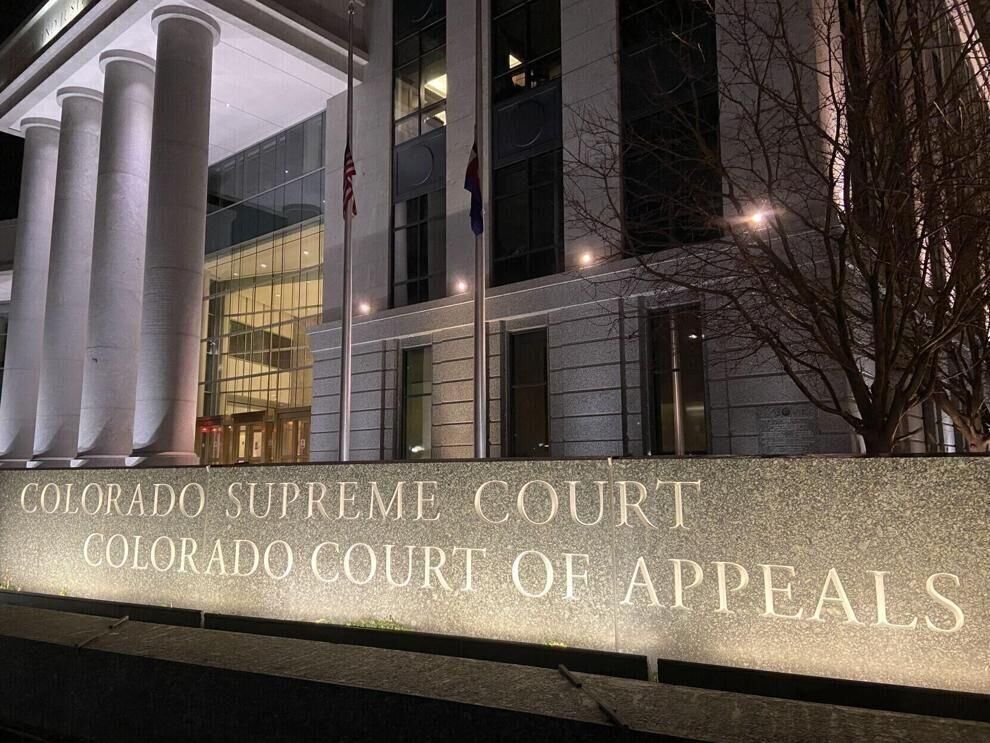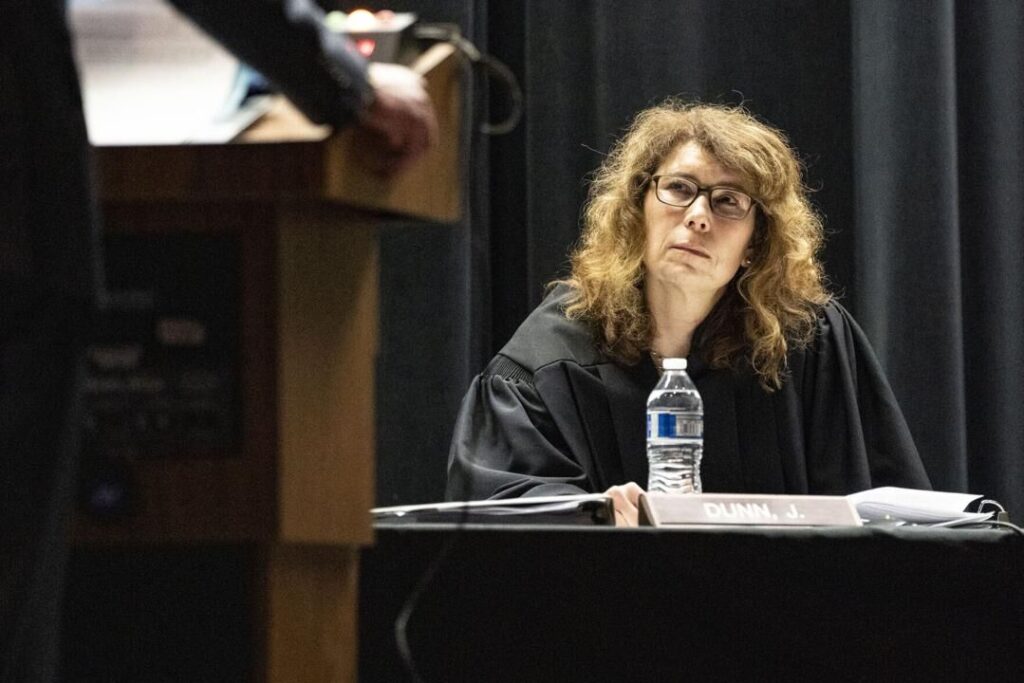Colorado Supreme Court to review cases on racial bias in jury selection, misbehaving attorneys, cold case

The Colorado Supreme Court has recently announced it will review multiple cases, including criminal appeals, a dispute between federal judges over the meaning of state law and the ongoing saga of a disgraced lawyer weaponizing the legal system.
At least three of the court’s seven members must consent to hear an appeal.
Within the past few weeks, the justices have agreed to examine what happens when a defense attorney’s conflict of interest may have hurt his client and whether prosecutors removed a juror of color because of her race. The court also signaled interest in a handful of ongoing trial court cases, including a recently-solved 1979 homicide where the defendant claims prosecutors are now trampling his rights.
A final appeal barely missed the threshold for consideration, as two justices voted in favor of hearing a case about the ability of debtors to challenge legal claims against them.
When the defense lawyer is also a defendant
At the same time defense attorney Dennis Hartley was representing Matthew Rodolfo Vansant Lopez in an El Paso County criminal case, he was also being prosecuted by the same district attorney’s office. Hartley had multiple drunk driving and traffic-related cases on his own record, and only resolved the charges the week before Lopez’s trial.
At one point in Lopez’s case, District Court Judge David A. Gilbert asked if Lopez was aware of “current circumstances,” without elaborating what those were, and if Lopez was fine with Hartley representing him. Yes, Lopez replied.
Last year, a three-judge panel for the state’s Court of Appeals overturned Lopez’s convictions for sexual assault, kidnapping and possessing an explosive device. Lopez had a constitutional right to a lawyer without a conflict of interest. The danger was that Hartley’s desire to avoid upsetting the district attorney’s office in his own case may have influenced his decisions in Lopez’s case.
Gilbert had a duty to ensure Lopez knew he was giving up his right to conflict-free counsel. But “nothing in the record indicates that Lopez was informed of the nature and potential consequences of the conflict beforehand,” wrote retired Supreme Court Justice Alex J. Martinez, who sat on the appellate panel.
Although the government argued Lopez should not receive a new trial unless he demonstrated Hartley’s conflict was linked to some action he took in Lopez’s case, the Court of Appeals declined to go that far.
Now, the Supreme Court has agreed to answer whether Lopez must show how Hartley’s own pending charges negatively affected his representation of Lopez.
The case is People v. Lopez.
The juror who was a police reformer
Nearly 40 years ago, the U.S. Supreme Court recognized that purposeful racial discrimination in jury selection is unconstitutional. Now, defendants may challenge a prosecutor’s dismissal, or “strike,” of a juror of color, forcing the prosecutor to give a “race-neutral” reason for the strike.
An Arapahoe County jury convicted Sterling Dwayne Austin in 2019 of murdering his fiancée. During jury selection, a nonwhite woman – whose name suggested she was Hispanic – described an experience she had in which an Arapahoe County sheriff’s deputy pulled her over for expired vehicle tags. When the deputy gave her a ticket, he marked her race as “white.”
“It just took me back to projects that I used to do in high school with racial profiling and the Denver Police Department,” said the woman, identified as Juror 32. She elaborated that Denver police officers had a practice of stopping Black and Hispanic people, but indicating on traffic tickets that their race was white, ostensibly to conceal the number of people of color being stopped.
The prosecutor moved to strike Juror 32 because her involvement in Denver police reform raised concerns “that she is going to have bias against” the officers who were witnesses in Austin’s case. The trial judge found it to be a race-neutral explanation and dismissed Juror 32.
The Court of Appeals subsequently ordered a new trial for Austin, noting the entirety of Juror 32’s response was clearly linked to her race. Therefore, there was nothing race-neutral about her dismissal.
The Colorado Attorney General’s Office appealed to the Supreme Court, arguing that people of any race can take issue with police bias, so “striking a potential juror because they have had negative experiences with police is not race-based discrimination.”
“This is not a case about all prospective jurors,” responded defense attorney Joseph Chase. It is about “a woman of color being struck because she told the truth about her lived experience with racist policing.”
The government asked the state Supreme Court to decide whether a juror’s belief that police engage in racial discrimination makes them “immune” to dismissal. The court opted to answer a narrower question: Did the prosecution actually offer a race-neutral reason for striking Juror 32?
The case is People v. Austin.

Cold case controversy
For more than 40 years, the 1979 murder of Evelyn Kay Day in Greeley went unsolved. Then in 2021, law enforcement charged James Herman Dye of Wichita with Day’s killing, following a break in DNA evidence.
Dye indicated he plans to offer evidence that another suspect killed Day, an apparent reference to Day’s husband, who was a person of interest.
Weld County prosecutors argued the defense should have to turn over its evidence of an alternate suspect before trial, so as not to “ambush” the government. Although District Court Judge Marcelo A. Kopcow initially sided with Dye, he issued an order this year for the defense to disclose all alternate suspect evidence at least 45 days before trial.
Dye appealed directly to the Supreme Court, pointing out the rules of criminal procedure require only the “nature of any defense” to be disclosed. Because it is the government’s responsibility to prove Dye guilty beyond a reasonable doubt, allowing prosecutors access to his evidence allegedly infringed upon Dye’s right to due process and other protections.
“It does not appear this Honorable Court has ever conferred such a right to the prosecution, and such a right does not appear to be contained in any statute or rule,” wrote attorneys for Dye.
The Supreme Court has directed the government to explain why Kopcow’s order should stand.
The case is People v. Dye.
Money on appeal
Earlier this year, a Denver judge found Veolia Water Technologies, Inc. owed Antero Treatment LLC $280 million in a breach of contract and fraud lawsuit. When a losing party appeals, they post a bond in order to ensure the prevailing party gets paid if the appeal is unsuccessful. In Veolia’s case, the judge allowed the company to pay for a $25 million bond.
Antero challenged that decision. It acknowledged a state law generally caps bonds in civil cases at $25 million, but pointed to a judicial rule requiring the bond to equal 125% of the total judgment. Under that rule, Veolia would need to secure $350 million while it appealed.
Antero asked the Supreme Court to declare the law unconstitutional, as it infringed on the court’s own authority to issue procedural rules. The Supreme Court has asked Veolia and Colorado’s attorney general to respond to Antero’s arguments.
The case is Antero Treatment LLC v. Veolia Water Technologies, Inc. et al.
Injured on the job
Although the bulk of the Supreme Court’s cases flow directly from the Court of Appeals or the trial courts, there is a little-used mechanism for allowing federal judges to ask the Supreme Court to interpret state law, if the answer would help with an unresolved legal issue.
Last month, U.S. Magistrate Judge N. Reid Neureiter sent one such question to the Supreme Court: If an employee is injured by another driver while operating a company vehicle, can the employee receive both workers’ compensation benefits and payment from their employer’s insurance company?
Two federal judges in Colorado recently reached opposite conclusions while handling similar injured-motorist cases. The state Supreme Court has previously ruled on the connection between workers’ compensation and insurance payouts, but it has never said what happens specifically when a motorist not employed by the company is the one who injures an employee.
Given the frequency of injured-motorist litigation, the question is “best resolved by the Colorado Supreme Court, rather than be left to the guesswork” of federal judges, Neureiter wrote.
The Supreme Court has accepted Neureiter’s request to weigh in.
The case is Klabon v. Travelers Property Casualty Company.

‘Paper terrorism’
In another unusual twist, the justices have signaled they may intervene in a controversy that landed directly at the state’s highest court without any underlying legal case.
This March, the Office of the Presiding Disciplinary Judge took the extraordinary move of disbarring attorney Nina H. Kazazian. The panel that heard her case used blunt language in condemning Kazazian’s long-running, “frivolous” legal actions across multiple jurisdictions and her deception.
“This varied, intentional, and pernicious misconduct leads us to conclude that we must impose the strongest sanction available to protect the integrity of the legal system and other litigants from any similar misconduct that Respondent may, in the future, engage in,” the disciplinary panel wrote.
Kazazian is now a mediator, having stopped practicing law shortly before being disciplined. Her professional webpage claims she “shifted her practice” and does not mention her disbarment.
Multiple people and entities petitioned the Supreme Court, asking it to put a stop to Kazazian’s initiation of court cases against them. They allege the litigation originated through Kazazian’s divorce, but she subsequently sued lawyers she encountered, made untrue allegations and cost her opponents $400,000 in legal fees. “Paper terrorism” was how one lawyer characterized her actions.
The disciplinary panel found Kazazian’s frivolous lawsuits and dishonesty required her disbarment, “without hesitation.”
The petitioners to the Supreme Court, however, warned the end of Kazazian’s status as a laywer means she is free to represent herself without being bound by attorney ethics.
“Her court actions are so persistent despite their 100% failure rate and the disbarment they cost her that they clearly are intended and calculated solely to harass, punish and terrorize her adversaries, and to fight, fight, fight, using the court system as a bludgeon,” they wrote.
The Supreme Court directed Kazazian to explain why it should not bar her from filing any more lawsuits on her own behalf.
The case is GHP Horwath, P.C. et al. v. Kazazian.
Challenging a debt collector
Finally, the Supreme Court narrowly turned down a case that questioned whether someone who never receives notice of a lawsuit in the first place – and loses by default – can forfeit their right to challenge the outcome.
In 2013, Marshall Recovery, LLC sued Hugh T. Dinh over a credit card debt. Dinh did not respond and a Denver judge entered a default judgment against him. Eight years later, Dinh moved to overturn the decision because Marshall Recovery never served him with notice of the lawsuit.
County Court Judge Beth Ann Faragher said she “didn’t have any doubt” that Dinh never received notice in 2013. But Dinh received paperwork related to the lawsuit in 2018. Consequently, Faragher decided Dinh had waited too long to file his challenge.
Dinh appealed unsuccessfully to Denver District Court, then turned to the Supreme Court. Colorado law has long been clear, his lawyers argued: When a defendant is not served with a lawsuit, the judgment is void. And a void judgment can be challenged anytime.
Weighing in on Dinh’s behalf was Colorado Legal Services, which represents low-income and elderly clients. It pointed to a survey from 2016 that estimated 71% of county court cases in Colorado resulted in default judgments, suggesting many more cases like Dinh’s. The National Association of Consumer Advocates and Colorado Consumer Health initiative also asked the Supreme Court to hear the case, arguing Colorado’s own precedent and those of other states allow defendants like Dinh to void a default judgment anytime.
Chief Justice Brian D. Boatright and Justice Carlos A. Samour Jr. indicated they would have granted Dinh’s appeal.
The case is Dinh v. Marshall Recovery, LLC.














